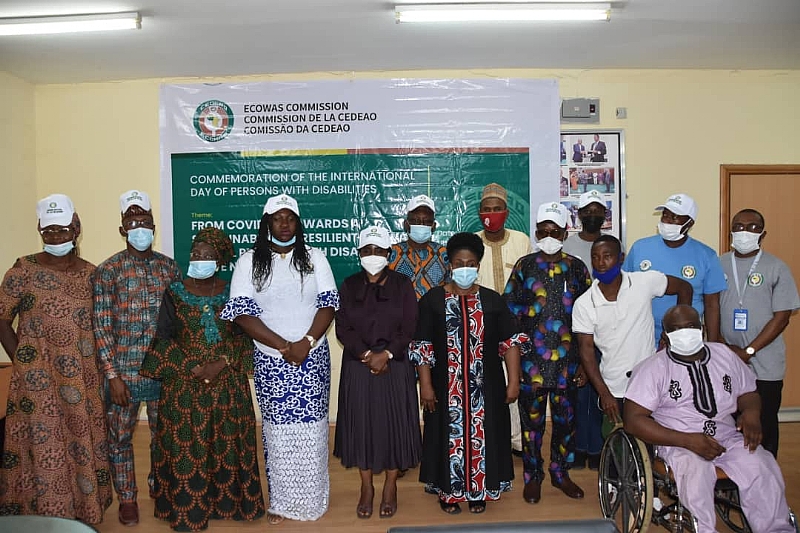
[ad_1]
The Department of Social Affairs and Gender of the ECOWAS Commission commemorated the International Day of Persons with Disabilities (IDPD) 2020, with two-day events on Thursday 18e and Friday, 19e March 2021, in Abuja, Nigeria.
The theme of the event was “FROM COVID-19 TOWARDS A SUSTAINABLE AND RESILIENT ECOWAS FOR ALL PEOPLE WITH DISABILITIES; DON’T LEAVE ANYBODY BEHIND ”. The global theme of the IDPD 2020 was “Building Back Better: Towards an Inclusive, Accessible and Sustainable Post-COVID-19 World”.
The International Day of Persons with Disabilities is celebrated every year on the 3rd of December in accordance with United Nations General Assembly resolution 47/3 which aims to promote a better understanding of disability issues and aims to mobilize support for the dignity, rights and well-being of persons with disabilities. The aim of the resolution is also to raise awareness of the benefits to be derived from the integration of people with disabilities in all aspects of political, social, economic and cultural life.
The ECOWAS Commission hosted the event in collaboration with the Association of Deaf Women of Nigeria to remind all of the plight of the persistent stigma and discrimination faced by people with disabilities, and the challenges they face in addressing access basic social services and economic opportunities. These barriers have increased further due to the impacts of the COVID-19 pandemic.
Thus, the ECOWAS Commission, in commemorating the International Day of Persons with Disabilities, called for more action to ensure the full and equal participation of persons with disabilities and their inclusion in all aspects of society and development in the region. . In particular, the Commission urges policy makers and stakeholders in West Africa to prioritize supporting the dignity, rights and well-being of people with disabilities in the context of the current COVID-19 pandemic .
The Commissioner, Social Affairs and Gender, ECOWAS Commission, Dr Siga Fatima Jagne, in her opening speech to the virtual dialogue between decision-makers and stakeholders underlined the importance of the International Day of Persons with Disabilities by reminding the Secretary United Nations General António Guterres declares that “Societies will never achieve the Sustainable Development Goals (SDGs) without the full participation of all, including people with disabilities. Respect for the rights of people with disabilities is a moral imperative ”.
She reiterated the commitment of the ECOWAS Commission to a more inclusive community and urged all ECOWAS stakeholders and partners to develop policies and implement actions in all areas of their work. , in order to reflect the current realities of people with disabilities, which will contribute to participation and inclusion in society.
Dr Jagne said the COVID-19 pandemic has exacerbated pre-existing inequalities and highlighted the gaps that need to be addressed to enable people with disabilities to exercise their rights. She therefore called for redoubled efforts to improve access to essential services such as health services, shopping malls, public transport, personal communication and access to information services that would enable people with disabilities to enjoy their fundamental rights in the same way as non-disabled people.
In her concluding remarks, she said that, in line with the strategic role of the ECOWAS Commission in promoting the social inclusion of all people in the region, the Department has launched a regional study on the inclusion of people with disabilities. with a view to developing a regional action plan to serve as a framework to promote disability mainstreaming.
Mr. Lefhoko Kesamang, representative of the African Union Commission, said in his remarks that there will be no sustainable development in ECOWAS if all vulnerable people, especially people with disabilities, are not taken into account. He recalled that the Heads of State and Government of the African Union, aware of the importance of the inclusion of persons with disabilities, adopted the AU Protocol to the African Charter on Human Rights and of peoples on the rights of persons with disabilities in Africa. The Protocol has so far been signed by seven African countries and it has urged ECOWAS member states to ratify the Protocol, which will address disability issues and contribute to the The Africa we want and the People’s ECOWAS.
Deaconess Adedoyin Beyioku-Alase, President of the Association of Deaf Women of Nigeria, said the deaf community is in a very vulnerable state, which has been made worse by the COVID-19 pandemic, and that the measures and protocols for prevention made it very difficult for them. However, she called for legislation that would ensure greater inclusion of people with disabilities in society.
Mr. James Lalu, Secretary General of the National Commission for Persons with Disabilities (NCPWD), said that women are most affected among people with disabilities (PLWD) and therefore commended the ECOWAS Commission for its collaboration with the Association of Deaf Women of Nigeria. The National Commission is ready to collaborate with the ECOWAS Commission in all aspects to improve the livelihoods of PLWDs in the sub-region, he concluded.
The Director, Humanitarian and Social Affairs, Dr Sintiki Tarfa Ugbe chaired the press conference on the second day of the event and the media discussion focused on inclusive disability recovery from COVID-19, and in particular on how to ensure timely access to COVID-19 vaccines. The importance of the media and how they can play an important role in amplifying the voice of the person with a disability was highlighted during the meeting.
The two-day event culminated with the distribution of palliatives of rice, vegetable oil and indomie noodles to 225 targeted people living with a disability (PLWD) as a demonstration of ECOWAS commitment to contribute to the response. recovery from COVID. In accordance with COVID-19 prevention measures and protocols, the ECOWAS Commission provided face masks and hand sanitizers and ensured that palliative distribution was done in batches to avoid overcrowding.
Source link